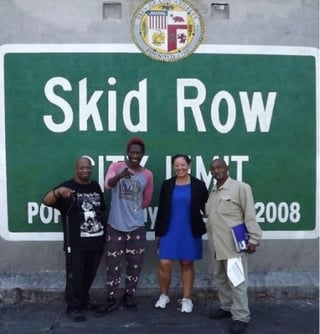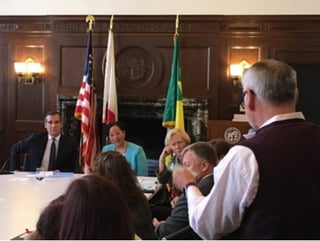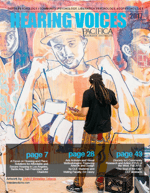This article first appeared in the 2017 edition of Hearing Voices. Displacing Boundaries of Race and Politics of Space in Los Angeles by Alisa Orduna, Dissertation Student in the Community Psychology, Liberation Psychology, and Ecopsychology Specialization.
 As the Mayor’s Director of Homelessness Policy, our City’s homeless community of 28,000 residents is my primary constituent base. For far too long, L.A. has addressed homelessness and poverty through policies of containment- isolating persons with severe mental illness, substance use disorder, sexual minorities, and African Americans – in “designated” spaces of the City. Homelessness and poverty were also addressed through therapeutic models that focused on assimilating the individual into a biased model of a “productive citizen” of society.
As the Mayor’s Director of Homelessness Policy, our City’s homeless community of 28,000 residents is my primary constituent base. For far too long, L.A. has addressed homelessness and poverty through policies of containment- isolating persons with severe mental illness, substance use disorder, sexual minorities, and African Americans – in “designated” spaces of the City. Homelessness and poverty were also addressed through therapeutic models that focused on assimilating the individual into a biased model of a “productive citizen” of society.
The crisis of homelessness has ruptured provincial thinking for emergence. Synchronicity occurred in 2016: Adoption of the Comprehensive Homelessness Strategy Report in alignment with the County’s own plan, allocation of significant city resources to fund services and housing development, and the passage of Prop HHH, a 10 year $1.2B housing bond, and the County’s Measure H, a 10 year $3.5B ¼ cent sales tax for supportive services and rental subsidies.
 My personal achievements are threefold. First, they include the signing of Mayoral Executive Directive No. 16, the “No Wrong Door” policy that holds City departments accountable to providing equitable city services to Angelenos experiencing homelessness.
My personal achievements are threefold. First, they include the signing of Mayoral Executive Directive No. 16, the “No Wrong Door” policy that holds City departments accountable to providing equitable city services to Angelenos experiencing homelessness.
Second, especially in a time when we have been shaken by state-sponsored violence against African Americans and Latinos, we have created the citywide Homeless Outreach and Proactive Engagement Team with the Los Angeles Police Department – yes, L.A.P.D. In close partnership with top LAPD command, we have established a special training curriculum to engage homeless Angelenos in housing and services. This work is slowly, but authentically, reshaping the. guardian police archetype to be more inclusive of who is protected.
Finally, I am working with grassroots leaders in Skid Row on a place-based strategy called the Emerald Necklace. Through this project, we will allow place to develop to reflect the hidden sense of community that allows many to survive and recover in this desert of humanity.
 Learn more about the work of students and alumni in the Community Psychology, Liberation Psychology, and Ecopsychology Specialization of the M.A./Ph.D. Depth Psychology Program by reading the full 2017 volume of Hearing Voices.
Learn more about the work of students and alumni in the Community Psychology, Liberation Psychology, and Ecopsychology Specialization of the M.A./Ph.D. Depth Psychology Program by reading the full 2017 volume of Hearing Voices.
“Hearing Voices” features the work of students and faculty in our Community Psychology, Liberation Psychology, Ecopsychology (CLE) MA/Ph.D. specialization, as we participate in transformative practices, artistic creations, and theoretical innovations going on in the communities and environments we share. We meet on campus three days a month for nine months of the year from various places in the U.S. and abroad. During the summer students are involved in fieldwork and research in sites of their own choosing based on interest, commitment, and vocation. Our program brings together community, liberation, and depth psychologies with environmental justice initiatives and indigenous epistemologies and practices in order to be part of the critical work of establishing a 21st century curriculum focused on decoloniality. Mary Watkins, Nuria Ciofalo, & Susan James, Core Faculty



